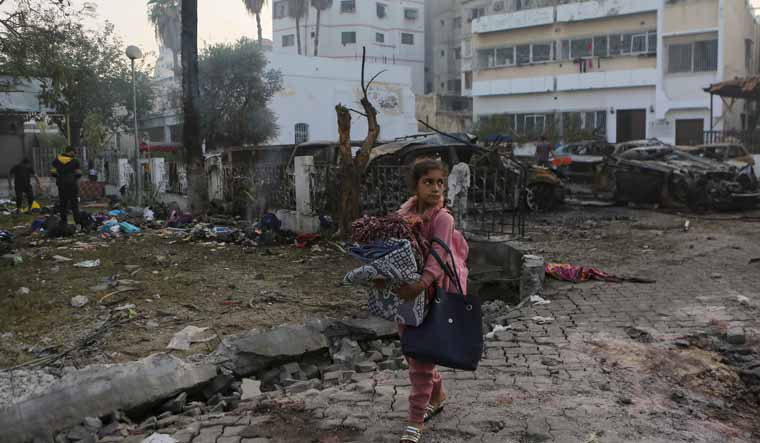Killing Journalists Cannot Kill The Truth
May 5, 2024 | Pratirodh Bureau
A Palestinian girl carries a blanket as she walks past the site of a deadly explosion at al-Ahli hospital, in Gaza City (Image: AP)
As I write, the grim count of journalists killed in Gaza since last October has reached 97. Reporters Without Borders (RSF) puts the number slightly higher at 108.
In the first 50 days of the conflict, journalists were being killed at a rate of roughly one per day, making Gaza indisputably the most dangerous conflict for journalists since the Committee to Protect Journalists began keeping records in 1992. By the time you read this, the toll is likely to have climbed even further.
The dead include two Israeli journalists killed in Hamas’s initial attack on October 7 last year, and three Lebanese killed in an Israeli artillery strike in south Lebanon. But the vast majority – more than 90 – are Palestinians killed in Gaza itself.
Some of those were the inevitable ‘collateral damage’ of a conflict that the Hamas-controlled Gaza Health Ministry says has already claimed more than 34,000 lives, caught in crossfire because they were working close to active fighting.
But the CPJ, RSF and a host of other news organisations accuse Israeli troops of targeting many of the journalists because of their work.
According to RSF, “many of them were reporting in the field and were clearly identifiable as journalists. Others were killed by strikes that specifically targeted their homes.”
The news organisations have demanded an investigation into the allegations and, if confirmed, it would constitute a war crime. It also undermines Israel’s claim to be the only democracy in the Middle East that respects freedom of the press.
Of course, a journalist’s life is worth no more than anybody else’s, but this is not so much about their safety as it is about our right to know.
Currently, Israel only allows Israeli and foreign journalists into the Gaza Strip on carefully controlled “embeds” – escorted trips with their own troops that necessarily give a myopic view of the fighting through Israeli gun sights.
The problem is not a lack of information. Social media is awash with rumour, conjecture, opinion and bloviation, but without information underpinned by the necessary journalistic rigor, it becomes impossible to filter out reliable fact from conjecture, rumour and pure fiction.
In short, without journalists free to work on the ground, we would be left with only social media posts of civilians caught in the violence, and the highly subjective news releases from Hamas and the Israeli military.
Attacks on the press are not limited to Gaza.
Across the world, journalism is under unprecedented assault.
The CPJ also tracks the number of journalists in prison around the world, with a snapshot taken on December 1 each year. Last year was the second highest on record with 320 behind bars. (It was also the first time Israel made the top six jailers of journalists, by imprisoning Palestinian reporters in the West Bank.) The figures have also steadily increased since 2000 when only 92 were behind bars.
